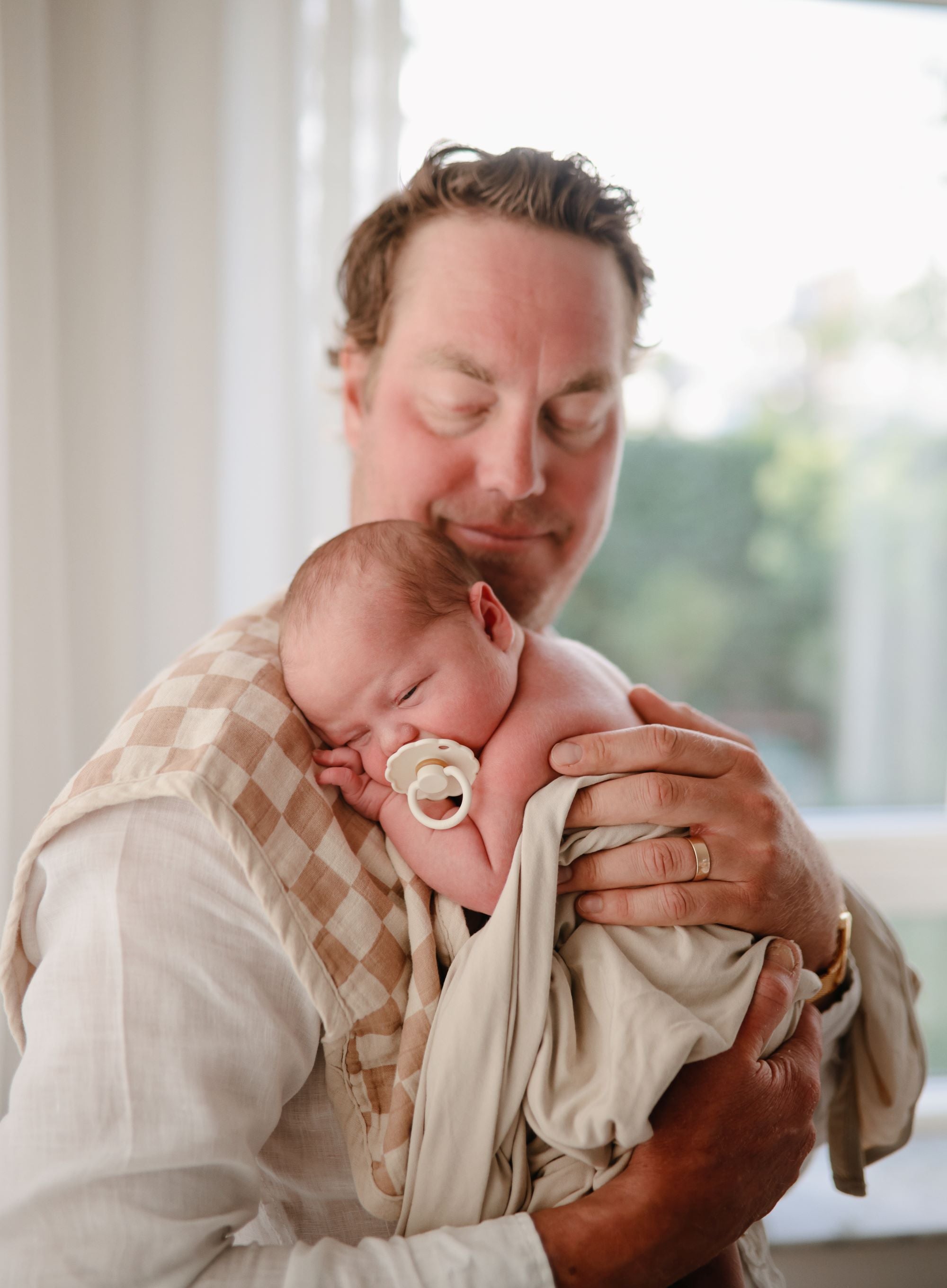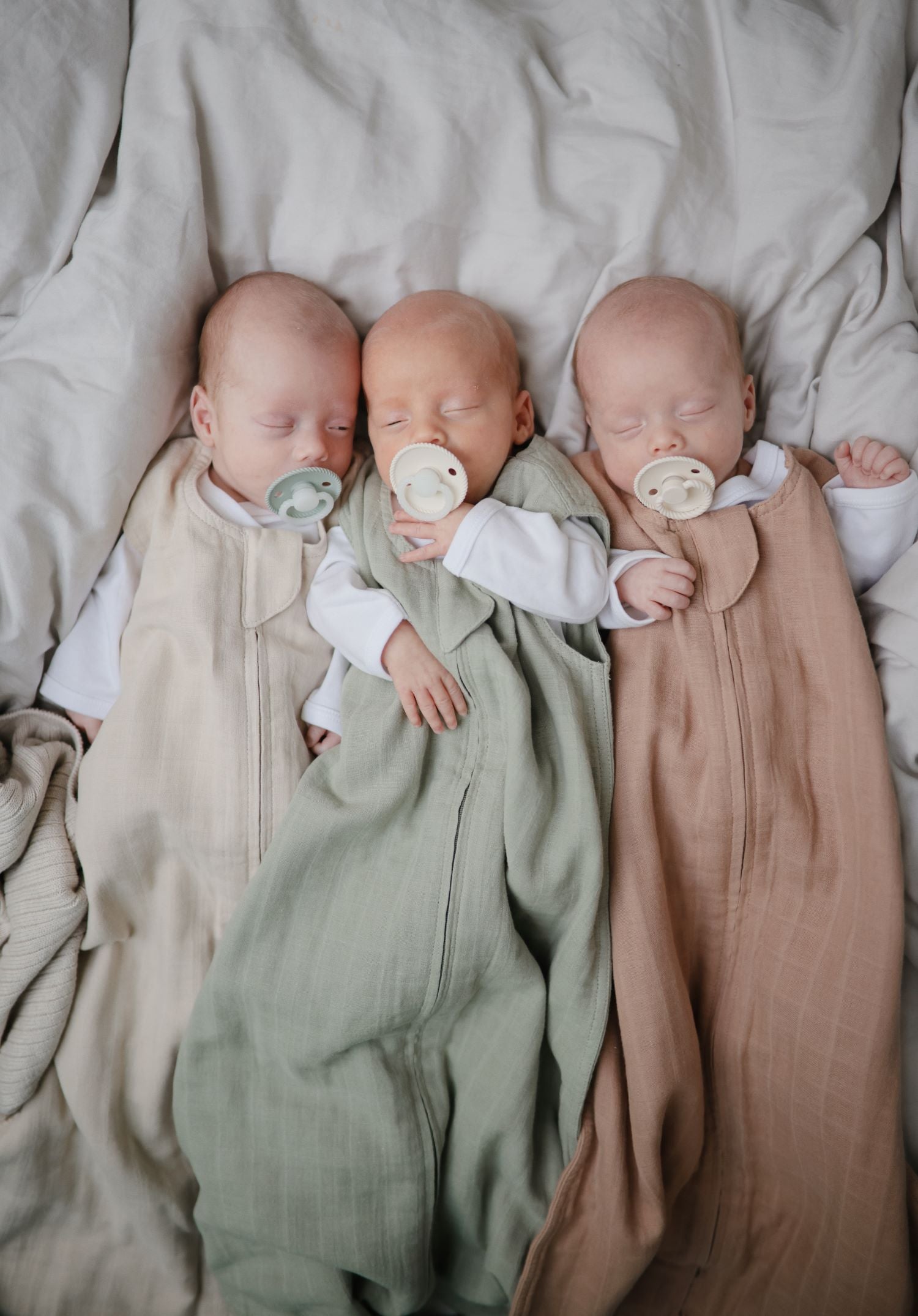List of contents:
My newborn baby always makes grunting sounds and moves around while sleeping.Why does my baby move or make noises while sleeping?
- What does active sleep look like in babies?
- Wait! Are you saying I shouldn't help my baby who cries at night?
- Do I need to worry about my baby making noises while sleeping?
- How long does active sleep last in newborn babies?
- When will babies outgrow active sleep?
- My baby is active, noisy, and makes grunting noises while sleeping. With all this, I can't sleep! What can I do?
Do you have a newborn who makes noises or moves around a lot while sleeping? We call this active sleep. I wanted to share some common questions I get about why your newborn is noisy while sleeping, what active sleep looks like, and how to help yourself get some sleep even if your baby is noisy.
My newborn baby always makes grunting sounds and moves around while sleeping. Why does my baby move or make noises while sleeping?
Newborns go through two distinct sleep cycles: quiet sleep and active sleep, and they spend about half their sleep time in each cycle. Active sleep is similar to REM sleep in adults, but there is one major difference:
In adults, our skeletal muscles are paralyzed during this stage — but in babies, this is not the case. Instead, babies move, make sounds (like grunts and cries), and sometimes even open their eyes, all while they are actually sleeping!
During these early months, your baby’s brain and body are still working hard to learn important skills, like digestion, even while they sleep. With all the hard work and development that happens during active sleep, you can expect your baby to be moving around and making grunts, fusses, and even the occasional cry.
Expert tip: Parents often use the word “gurgling” as a general term to describe baby noises. However, among health professionals, the term “gurgling” refers specifically to a baby who is having difficulty breathing.
While some sounds during your newborn's sleep are a normal part of active sleep, other sounds can be a sign of pain, discomfort, or stress .
What does active sleep look like in babies?
Would you like to watch this video? Turn the sound on. I want you to see what a real newborn baby sleeps like! Newborns can be very active while sleeping.
If you hear that sound at night, do you immediately get out of bed and grab your baby? Did you know that doing this could accidentally wake your baby up at night? Let me explain.
All of these babies are moving around and maybe even crying. But... they're all sleeping! This is active sleep. Active sleep can make you feel like your baby is awake from 3:00 to 6:00 a.m., " fighting the swaddle " or struggling with gas. If you mistake this period of active sleep for being awake and come right in, you could accidentally wake your baby!
So, if you hear your baby making grunting, whining, or groaning sounds while sleeping, know that these are usually normal sounds of active newborn sleep. However, if your baby seems sick , sounds congested , or you are concerned about whether what you are hearing is normal , please check with your pediatrician.
Wait, are you saying I shouldn't help my baby who cries at night?
No! Absolutely not! If your baby needs you, of course you will respond. But before we respond, we just need to pause and observe.
Take the time to listen to your baby before you react. Give your baby 30-60 seconds before you rush to pick him up. This will help determine if your baby is just in an active sleep phase or is actually awake!
Expert tip: If your baby is slipping out of the swaddle during active sleep, check out my tips on how to swaddle properly.
Should I worry if my baby makes noises while sleeping?
While many of the sounds your newborn makes during active sleep are normal, there are some sounds that may be cause for concern. If you notice any of the following, it's time to call your doctor or seek medical attention:
- High pitched or squeaky sound.
- Rapid breathing of more than 60 breaths per minute that lasts more than a few seconds or occurs repeatedly throughout the night.
- Difficulty breathing. This may look like the area between or under the baby's ribs is pulling in, a grunting sound after each breath , or labored breathing.
I understand it can be difficult to know what is a normal sign of active sleep and what might be a problem. If you have any concerns about your baby, always talk to your pediatrician.
How long does a newborn baby's active sleep last?
Newborns spend almost half of their sleep time in active sleep. With a baby's sleep cycle lasting about 50 minutes, almost 25 minutes of that is active sleep.
When do babies start to lose active sleep?
You may notice that your baby makes a lot less noise while sleeping as the newborn months pass. Around 3-5 months of age , their sleep cycle begins to change to be more like adult sleep. During this change, active sleep will decrease.
Expert tip: Even though your little one is starting to transition to a more adult-like sleep cycle, you may still notice a lot of movement. Active babies usually start sleeping more calmly around 5 months.
My baby is active, noisy and makes grunting noises while sleeping. With all this, I can't sleep! What can I do?
Your sleep is vital to your health and that of your baby. So, now that you know about active newborn sleep , here are some tips to help reduce nighttime disturbances:
- Move your baby's crib away from you. (Try putting it across the room or even in a closet or bathroom if it's well-ventilated.)
- Set the sound machine between you and your baby.
- Reduce the monitor volume if the baby is sleeping in a different room.
Wondering when to move your baby into their own room? My blog on room sharing covers the research and will help you decide when the time is right. When you’re ready, I also have a step-by-step guide to moving your baby from your room to the nursery .
If you need more help with your baby's sleep, my class " Will I Ever Sleep Again? " for Newborns Without Crying will give you the tools you need. I'll guide you every step of the way to build a healthy sleep foundation for your little one.
Reference:
- Wielek et al. (2019). On the Development of Sleep States in the First Weeks of Life
- Patel et al. (2022). Physiology, Sleep Stages
- Shakankiry, H. (2011). Sleep Physiology and Sleep Disorders in Childhood
- McClay, J. (2022). Stridor & Laryngomalacia: Is My Baby's Noisy Breathing Serious?
- Reuter, Moser, and Baack. (2014). Respiratory Distress in the Newborn
































































































